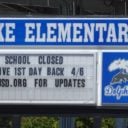Rasmussen aside, many pollsters attempt to measure Americans’ views on economic fairness. Not only is it the case that they are usually wrong, but they are incredibly misleading because the measurements are simply too superficial. This has been a phenomena that the Democrats have long been able to capitalize on, and the GOP consistently underestimates; only to find on election day – much to their surprise – that they have been thumped.
Firstly, respondents in any given survey, are providing an answer to the pollster that reflects more of their specific economic condition at that time, rather than a deeply – or shallow – held philosophical belief on economic fairness. There has only been one question that Americans – regardless of party or demographics – have consistently given a response that is a reflection of philosophy.
Voters overwhelmingly believe in the value of hard work and think it should be rewarded, yet as of now, over half continue to feel the U.S. economy is not fair.
On June 3, a Rasmussen Reports survey found that 90% of Likely U.S. Voters reported that they believe it is important that people who are physically able to work are required to support themselves – that included 71% who consider it “Very Important.” Americans, despite repeated attempts to destroy it, have consistently demonstrated a belief in what is known to be “work ethic,” which historically derived from the “American mainstream Protestant ethic,” as outlined by Weber over 100 years ago. The idea of a “calling” or duty to work has long been embedded in our national identity since the founding of our country, and it has survived until today.
The same survey reported that 90% also think it’s important to ensure that everyone who is willing to work hard have an opportunity to earn themselves a middle class lifestyle, with 67% who regard it as “Very Important.” That is plenty enough for an electoral majority, is the key to Democrats’ electoral success, and why surveys that report Americans do generally feel the American economy is fair, are wrong.
Americans’ views, frankly, make little sense because they change as each respondents personal situation changes, thus responses often contradict each other. For instance, most voters believe it is not only fair that people who build successful companies become rich, but it also helps the economy in the process. On May 7, 60% of Likely U.S. Voters felt that letting entrepreneurs get rich helps the economy, just 13% said that it hurts the economy – liberals of course. Not inconsequential, 10% thought it had no impact, and 18% were not sure.
A majority, 64%, also report to believe that the economy is fair to women, blacks and Hispanics. However, a plurality believes that the economy is unfair to hard workers, and a solid plurality believe that business prosperity and economic fairness are inherently at odds. A June 3 survey, found that overall, just 45% of voters now view the U.S. economy as at least “somewhat fair” to hard workers, while 51% consider the economy in this country to be unfair. This is an improvement since May, but similar to attitudes in March, February, and December, just after the GOP electoral defeat.
In other words, although Americans are inconsistent regarding their views on economic fairness, the GOP message has never reflected this, and is fixed on the traditional American ideal that anyone who works hard can achieve the American dream. Sadly, Americans do not overwhelmingly agree anymore, with good reason. Rasmussen, and others, are not capturing in these fluctuating results how Americans may increase their optimism when their specific situation warrants it, but fundamentally speaking, the American dream is in deep trouble as a campaign strategy. Perhaps, Americans want to believe it to be the case, but come election day it certainly is not (For reference, see 2012 election).
Republicans, as Tim Carney recently argued in The Examiner, should be making the case that the system is rigged against them, because it is and a product of progressivism originating from both parties. Real conservatism does not support corporate welfare as an extension of economic tax policy. Real conservatism argues for a tax system that recognizes no one individual or group of individuals should be given special interest treatment.
I have long argued this premise, and wholeheartedly agree with Carney when he said:
Conservatives and Republicans would do well to admit this, and declare it a serious problem. Attacking Obama for “hating success” or being “anti-business” is not only factually flimsy, it is a political loser. Such attacks don’t appeal to the folks who have been suffering in our current economy.
Of course, this requires a reformation in the party, and for those who favor the status quo I would say to them this: whether 2014, 2016 or beyond, you will be forced to pass the torch in the GOP, because you will not have any power to help your crony friends when you cannot get elected.
On April 11, Americans were almost evenly divided when asked if the United States has a free market economy or a crony capitalist one. To Scott Rasmussen’s credit, he did recognize that, “this helps explain why Americans think more government involvement in the marketplace makes it less fair,” yet turn around and vote for a Democrat. The survey found that 36% of “American Adults” believe the United States has a system of free market capitalism. But nearly as many – 34% – view it as a crony capitalist system, while 29% were not sure.
However, a solid majority – 68% – believe that government and big business work together against the rest of us (66% believe contracts are awarded through cronyism rather than merit or consumer cost), and again, they are right. Coupled with the fact that only 35% think that the American economy is fair to the middle class, and the Democrats’ immoral argument of “fairness” becomes pretty effective.
The GOP has both a problem and an opportunity, because progressivism is the cause of the much-hated practice of cronyism, but the problem is that many in the GOP are progressive cronies. Time to purge the party – that sounds “fair” to me.
To read more about how our human nature interacts with the different elements of each political philosophy in American politics, and why it is that conservatives academics and politicians have failed to make a decisive argument for our founding principles, check out my new book “Our Virtuous Republic.”
Don’t forget to follow and tweet #Truth to @Peoples_Pundit or @LauraBaris to receive your discount code for the new book “Our Virtuous Republic” and help spread the truth, while supporting veterans through the action of civil society. Learn more here in Hometown Veterans Outreach Letter.
Related articles
- Poll: Voters Give Biggest Trust Margin to GOP on Spending, Democrats on Environment (richardbaris.wordpress.com)
- GOP Regains Trust Over Dems on Majority of Issues (richardbaris.wordpress.com)
- Dems Continue to Lose Support in Generic Congressional Ballot (richardbaris.wordpress.com)







